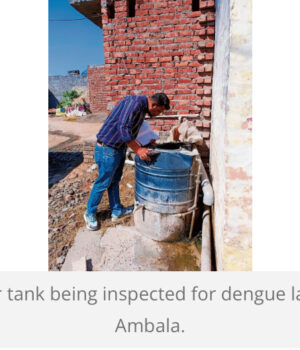The Ambala district in India is grappling with a concerning surge in dengue cases this year, with over 430 cases already reported as of last Friday. This alarming statistic has far surpassed the 384 cases reported in the previous year, raising significant concerns among local residents and health authorities alike.
The outbreak of dengue in the region has triggered a blame game, with local residents pointing fingers at the authorities for inadequate preparedness in the face of this public health challenge. Simultaneously, the Health Department is attributing the spike in cases to a combination of factors, including waterlogging caused by floods and untimely rainfall.
The situation in Ambala highlights the critical need for comprehensive measures to address the rising incidence of dengue and prevent its spread. As the number of cases continues to climb, it is essential to examine the various factors contributing to this concerning public health crisis.
First and foremost, the surge in dengue cases has raised questions about the readiness and response of local authorities to deal with vector-borne diseases like dengue. The higher number of cases this year compared to the previous year has led to accusations of a lack of preparedness in terms of public awareness campaigns, proactive vector control measures, and health infrastructure.
Local residents, understandably worried about their health and safety, have expressed frustration at the perceived lapses in the management of the dengue outbreak. They emphasize the need for better education on preventive measures, regular clean-up drives to eliminate mosquito breeding sites, and more accessible healthcare facilities.
On the other hand, the Health Department’s perspective sheds light on the environmental factors that may have contributed to the rise in dengue cases. Factors like waterlogging due to floods and untimely rainfall can create ideal breeding grounds for the Aedes aegypti mosquito, which is the primary vector responsible for transmitting the dengue virus. These meteorological conditions can exacerbate the dengue problem by providing ample opportunities for mosquitoes to proliferate.
The ongoing blame game between local residents and health authorities underscores the urgency of a collaborative approach to tackle the dengue outbreak. It is crucial for both parties to work together to enhance public awareness, improve water drainage systems, and strengthen vector control efforts.
Furthermore, addressing the root causes of dengue, such as proper waste management and ensuring clean and water-free environments, is of paramount importance. Public health campaigns aimed at educating residents about preventive measures, early detection, and the importance of seeking medical attention in the event of dengue symptoms are essential components of a comprehensive response strategy.
As Ambala continues to grapple with this dengue crisis, it is a stark reminder of the need for a collective effort to combat vector-borne diseases. By coming together to address the concerns raised by local residents, tackle environmental challenges, and implement proactive measures, the region can hope to curb the rise in dengue cases and protect the health and well-being of its residents.










